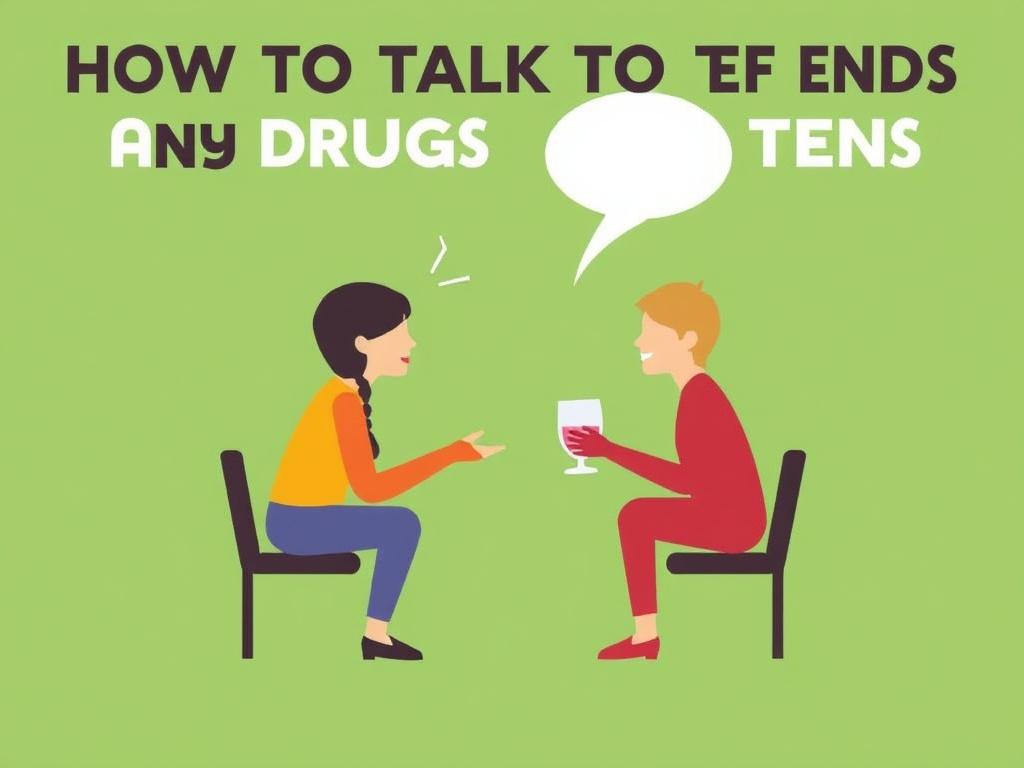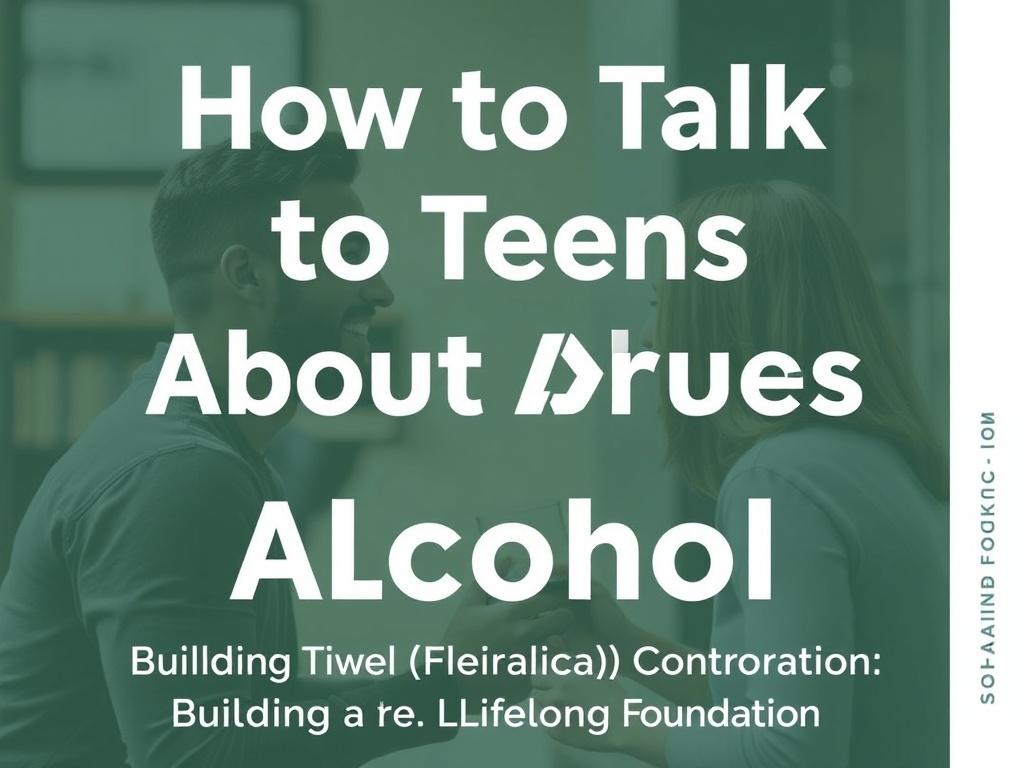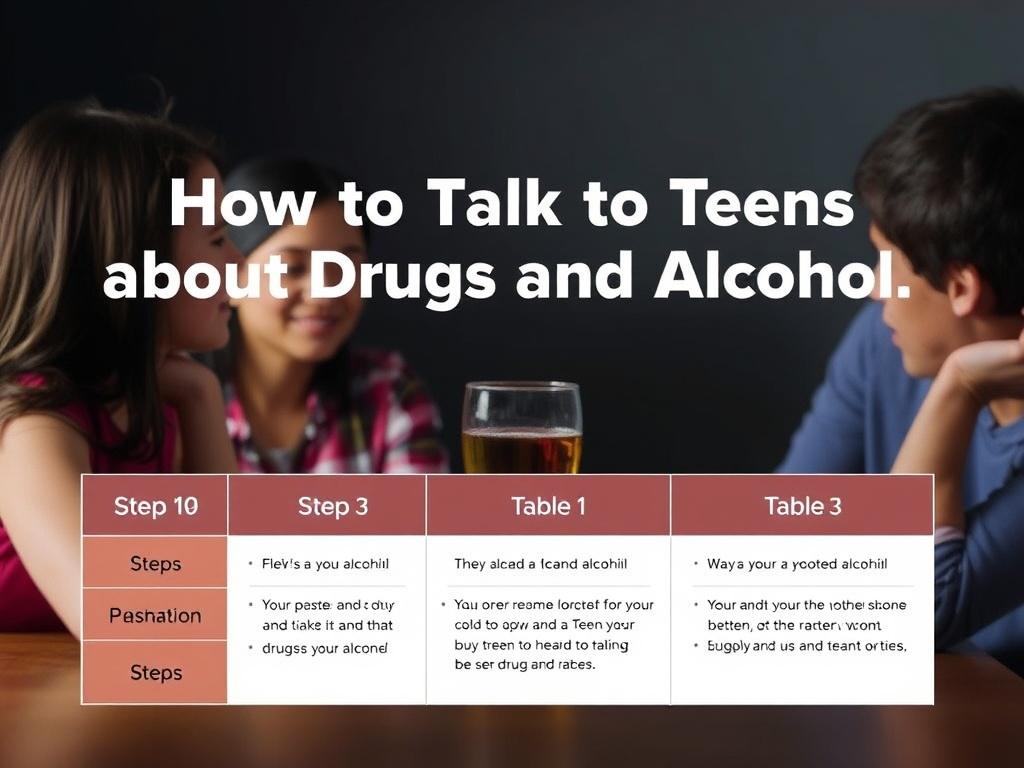SQLITE NOT INSTALLED
Talking about drugs and alcohol with teenagers can feel like navigating a maze. As a parent or guardian, you want to protect your teen and prepare them for the choices they will face, but sometimes starting the conversation is the hardest part. The good news is, with the right approach, understanding, and tools, these discussions can become natural, open, and even empowering for both you and your teen. This article will walk you through everything you need to know about how to talk to teens about drugs and alcohol in a way that resonates, builds trust, and sends a strong message.
Why Talking to Teens About Drugs and Alcohol is So Important
First, let’s explore why it’s critical to have these conversations. As teens grow, they become more curious and independent. Peer pressure and media influence often glamorize drug and alcohol use, sometimes making it seem harmless or even desirable. Yet, the consequences can be serious: impaired judgment, risky behaviors, mental health issues, addiction, and long-term health problems. Early education and communication are key preventative tools. Teens who talk openly with their parents about drugs and alcohol are less likely to engage in risky behavior.
Remember, your message can make all the difference. When teens feel heard and respected, they’re more likely to listen to your guidance. Neglecting to talk about these topics can lead to misinformation or make teens feel like they have to hide their experiences and questions, which can increase risk.
The Benefits of Open Dialogue
- Builds trust: Teens feel safer sharing their true thoughts and experiences.
- Prevents misinformation: Teens get facts from reliable sources instead of rumors or social media.
- Encourages responsible decisions: Teens understand the risks and consequences better.
- Strengthens your relationship: Regular conversations about difficult topics bring you closer.
- Reduces stigma: Teens won’t feel ashamed to ask for help if they ever struggle.
When is the Right Time to Start Talking About Drugs and Alcohol?
It’s never too early to begin planting seeds for open communication around substance use. Ideally, these conversations should start before your teen encounters opportunities to experiment. According to experts, discussions should begin in early adolescence, around ages 10 to 12, adapting as your child matures. But don’t worry if you missed the “perfect” starting point — it’s always better late than never.
Starting conversations now will help normalize the topic. Early talks can focus on values, decision-making, and the importance of health, gradually moving into specifics about drugs and alcohol as your teen’s social world expands. The key is making discussions ongoing rather than a one-time event. Revisit the conversation regularly in small, relaxed moments.
Signs Your Teen Might Be Ready to Talk
| Teens Might Be Ready To… | What It Looks Like |
|---|---|
| Ask Questions About Substances | Bringing up drugs or alcohol in conversation, or asking what different substances do |
| Show Awareness of Peer Use | Talking about friends using substances or mentioning what they see on social media |
| Express Interest in Social Situations | Discussing upcoming parties, events, or gatherings where alcohol or drugs might be present |
| Seek Guidance or Support | Openly sharing worries or asking for advice about how to handle pressure |
How to Start the Conversation: Tips for Parents and Guardians
Starting the conversation on drugs and alcohol can be intimidating, but it doesn’t need to be a formal sit-down talk that feels like an interrogation. Here are some helpful tips to ease into the discussion and make it effective.
1. Choose the Right Moment
Finding a calm, private time can make a big difference. Sometimes casual settings, like car rides, family meals, or walks, offer natural opportunities for teens to open up. Avoid starting the conversation when either of you is stressed, tired, or distracted — timing matters.
2. Be Honest and Transparent
Teens appreciate honesty. Share your own experiences or feelings about drugs and alcohol, including any struggles or mistakes you made when you were younger. This helps humanize the topic and keeps it from feeling like a “lecture.” Authenticity goes a long way.
3. Use Open-Ended Questions
Instead of asking “Do you use drugs?” try asking “What do you know about drugs?” or “What do your friends think about drinking?” Open-ended questions invite conversation rather than yes/no answers.
4. Listen More Than You Talk
Show genuine interest in your teen’s thoughts and feelings. Avoid interrupting or immediately jumping to conclusions. Listening builds trust and encourages honesty.
5. Stay Calm and Non-Judgmental
Teens may share things that worry you. Instead of reacting with anger or fear, maintain a calm demeanor to keep communication open. Judgement may push your teen away or cause them to shut down.
Common Myths About Teens and Substance Use
Understanding common myths helps prepare you for conversations and corrects misconceptions your teen might have heard. Let’s break down some prevalent myths you may encounter:
| Myth | Reality |
|---|---|
| “Everyone is doing it.” | Most teens do not use drugs or alcohol regularly. Peer pressure can make risk behaviors seem more common than they really are. |
| “It’s just a phase.” | While experimentation is common, early use of substances can increase risks for addiction and impair brain development. |
| “Drinking alcohol is safe if you’re with friends.” | Alcohol affects judgment and coordination even in small amounts, and unsafe situations can arise quickly. |
| “Marijuana isn’t harmful because it’s natural.” | Marijuana can change brain chemistry and impair memory, attention, and motivation, especially for teens. |
What to Include When Talking About Drugs and Alcohol

It’s important your conversation covers more than just “don’t do drugs.” Focus on creating awareness, understanding reasons behind substance use, and strategies for making good choices.
Topics to Discuss
- Types of drugs and alcohol: Basic facts about common substances teens might encounter.
- Short and long-term effects: How these substances can impact health, emotions, brain development, and goals.
- Social and legal consequences: Risks such as accidents, addiction, trouble with the law, or relationship problems.
- Influence of peer pressure: How to recognize and handle pressure from friends.
- Healthy coping mechanisms: Ways to deal with stress, anxiety, and emotions without substances.
- Resources for help: Where to go if your teen or their friends ever need support.
Framing the Conversation with Empathy
Remember that substance use often relates to emotions or social challenges. Frame your talk around support, not just rules. For example, “I want to make sure you have all the facts and feel confident saying no even if you’re nervous.” Empathy shows your teen you’re their ally, not an adversary.
How to Handle Difficult Questions or Confessions
Your teen might surprise you with bold questions or even admit to experimenting. Staying calm and responsive is essential.
Strategies to Respond Effectively
- Ask clarifying questions: “Can you tell me more about what happened?”
- Validate feelings: “It sounds like you’re feeling confused worried.”
- Avoid punishment talks in the moment: Focus on understanding first.
- Discuss next steps calmly: “Let’s figure out how to keep you safe going forward.”
- Seek professional help if needed: Don’t hesitate to involve counselors or healthcare providers.
Practical Tips for Ongoing Communication
Once you’ve had the initial talk, keeping the lines of communication open is essential. Here are some practical tips:
Set Regular Check-Ins
Scheduling time to connect regularly helps your teen know you’re available. It doesn’t always have to be a serious talk — casual chats can reveal a lot.
Stay Informed
Educate yourself about current trends in teen substance use, slang, and new drugs so you can understand and talk knowledgeably.
Encourage Healthy Activities
Support your teen in sports, hobbies, or clubs where they build confidence and social networks free from substances.
Model Responsible Behavior
Your own habits around alcohol and prescription drugs set the tone for what your teen sees as normal.
Use Positive Reinforcement
Celebrate your teen’s choices to avoid risky behaviors, reinforcing their good decisions.
How Schools and Communities Can Help
Talking about drugs and alcohol isn’t just a family issue; schools and communities play a big role. Many schools run programs that provide accurate information and skills training to resist peer pressure. Community initiatives also offer support groups for teens and parents, recreational activities, and resources for treatment or counseling.
Partner with your teen’s teachers, school counselors, or local health agencies for extra support. Together, you create a safety net around your teen during critical formative years.
Examples of Community Resources
| Resource Type | Description | How to Access |
|---|---|---|
| School Counseling Services | Provide confidential support and education on substance use and mental health. | Contact your child’s school directly. |
| Youth Substance Prevention Programs | Educational workshops and peer-led discussions to promote drug-free lifestyles. | Through local community centers or public health departments. |
| Support Groups for Parents and Teens | Peer support meetings for sharing experiences and advice. | Find groups via nonprofit organizations or online directories. |
| Professional Treatment Services | Medical and psychological care for teens encountering addiction or misuse. | Referral through healthcare providers or specialist clinics. |
Common Challenges and How to Overcome Them
Even with the best intentions, talking to teens about drugs and alcohol comes with challenges. Being prepared can help you keep conversations productive.
Challenges:
- Resistance or denial: Your teen may minimize the risks or insist “it won’t happen to me.”
- Embarrassment or awkwardness: Both parents and teens might avoid difficult topics.
- Conflicting messages: Influences from friends, media, or even family members who use substances.
- Lack of trust: Teens worried about punishment may shut down or lie.
Solutions:
- Be patient: Repeated conversations over time build understanding.
- Normalize the topic: Treat the talk as a normal part of growing up.
- Highlight your support: Emphasize your care and availability over criticism.
- Set clear expectations: Consistent rules paired with love help teens feel secure rather than rebellious.
- Seek outside support: When challenges persist, professional counseling can help bridge gaps.
Final Thoughts: Building a Lifelong Foundation

Learning how to talk to teens about drugs and alcohol isn’t about delivering a one-time speech or setting rigid rules. It’s about building a foundation of trust, education, and support that lasts throughout adolescence and well beyond. These conversations empower your teen to make informed, confident decisions, and strengthen the bond that makes your family a source of safety and understanding.
No matter what questions arise, where your teen is in their journey, or how difficult conversations feel, remember this: your willingness to engage openly, listen compassionately, and provide guidance is one of the best protections your teen can have. Approach these talks as a bridge, not a barrier, and you’ll help your teen navigate the complex world of drugs and alcohol with greater clarity and confidence.
Summary Table: Steps to Talk to Teens About Drugs and Alcohol

| Step | Action | Why It Matters |
|---|---|---|
| Start Early | Begin conversations around ages 10-12. | Lays groundwork before exposure. |
| Create Open Dialogue | Use honest, calm conversations with active listening. | Builds trust and openness. |
| Provide Accurate Information | Discuss real effects, risks, and myths. | Helps teens make informed choices. |
| Empathize and Support | Avoid judgment and acknowledge feelings. | Keeps communication open and reduces shame. |
| Revisit the Topic Regularly | Have ongoing small talks rather than one-time lectures. | Reinforces messages and adapts to teen’s growth. |
| Seek Help When Needed | Utilize community or professional resources. | Ensures additional support for challenges. |
If you take away one message from this article, it’s that your involvement shapes your teen’s future. Keep the conversation flowing, stay informed, and offer love and understanding as your teen navigates these complex subjects.
